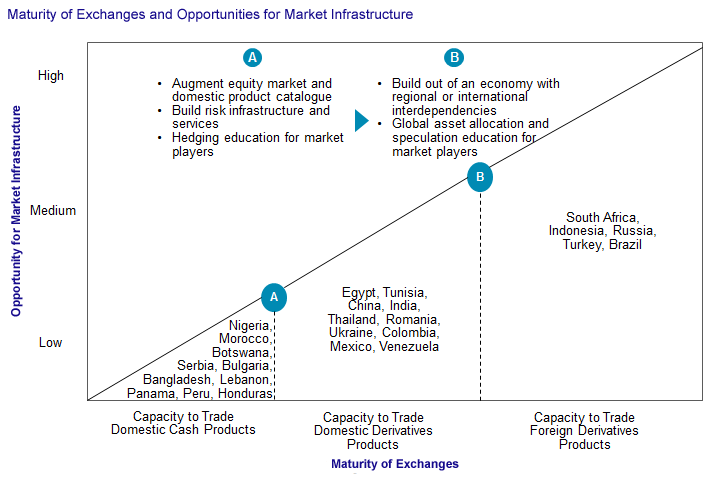Exchanges in Developing Markets: Risks and Opportunities
Abstract
Developing countries have the capacity to reap more opportunities for their exchanges when they try to de-correlate themselves from their financial sector, economy, and political fundamentals through strategic partnerships and innovation.
Celent analyzed 88 developing countries and their 135 exchanges through the prism of financial sector and economic growth benchmarking. This report highlights which countries are already mature enough to develop the exchanges of the future. For countries limited by low economic or financial indicators, or simply by their national, regional, or international politics, we analyze the maturity of developing exchanges and how they can grasp more opportunities.

These exchanges could grasp opportunities (such as the “new” asset classes that, according to recent global regulatory reforms, will become electronically traded, cleared, and reported) by building an infrastructure to position themselves in the new trading and post-trading value chain or in the data products they will be able to provide once connectivity reaches their part of the world. Celent also underlines the risks we believe exchanges will face globally in the next few years, and those that developing countries’ exchanges will need to tackle, such as the extreme pressure on cost, and the consolidation threat it represents for smaller players.
“It is important to highlight the diverse problems that advanced and developing countries’ exchanges are facing,” says Joséphine de Chazournes, a senior analyst with Celent’s Securities & Investments practice and coauthor of the report. “Cybersecurity is a global risk that developing exchanges also have to prepare for, but the risks that high-frequency trading has brought to advanced economies are something developing countries can actually learn from. They can try to develop the right framework and regulation the first time around.”
“Opportunities in advanced and developing countries can be aligned,” says Hua Zhang, an analyst with Celent’s Asian Financial Services Group and coauthor of the report. “Indeed, through partnerships with more mature exchanges, developing countries’ exchanges can try to de-correlate themselves from their country’s financial sector, economy, or politics and reach the next stage of maturity.”

